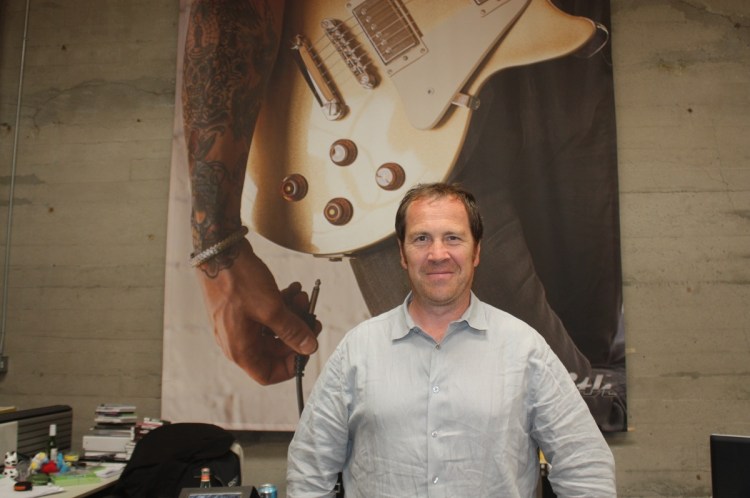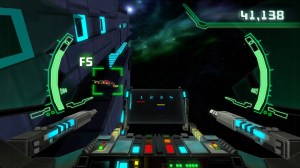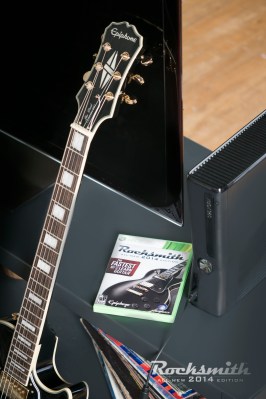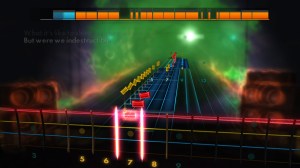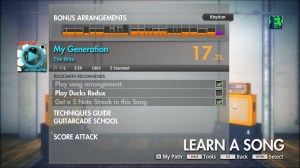GamesBeat: With Guitar Hero giving way to the dance craze, everyone seems to assume that’s where the interest in music games went: from guitars to dancing with Just Dance (a Ubisoft game). The numbers associated with dance right now are very high. What does that mean as far as this comeback for the guitar goes? You have 1.5 million now, but you see tens of millions of dance games being sold.
Detoc: We’re not looking at the same products. There’s the route of wanting to rock, like in the Guitar Hero products. But I think Rocksmith is more comparable to something like Wii Fit. The analogy to Rock Band or Guitar Hero is all in the style – it’s that promise of being a rock star that ties them together. What you really want to do with it, though, is improve yourself. As I say, there’s a real-life benefit at the end. So I wouldn’t compare it to Rock Band or Just Dance so much as Wii Fit.
GamesBeat: It seems like one of the benefits of not having a direct rival right now is that you can take your time getting the game right. You don’t have to do a new version of the game every six months. Is there a benefit to the market being in the state it is now? If the expectation as far as sales were 20 million per year, you’d be in a very different place.
Detoc: Maybe, maybe. Also, though, the way people consume Rocksmith is not quite the same. We’ve sold a lot of songs, just like Rock Band did. You get the game and then you consume additional content afterward. It’s by far our best-performing title as far as add-on content. And that grows with the installed base.
If we changed the game too often, we’d run the risk of sending the wrong message. People would get the impression that our method isn’t really set. Rocksmith 2014 improves on Rocksmith, but the base method is the same. It just makes it a little more friendly, with better reward systems and more flexible navigation. You have the session mode, which is an advancement in technology.
GamesBeat: If there is a larger mass market waiting for this, what do you think it is? Is it an education market, a pure entertainment market?
Detoc: It’s both. That’s the thing. Our media today are so flexible and powerful that we’re able to let people do things they couldn’t do with media before. If you take classes on the Internet, you can get a degree now. People are going to have to figure out how to deal with that now, because watching MIT courses online probably isn’t the same as going to MIT, but what’s fascinating is that now we can think of all these different possibilities as a result. Think of a brilliant kid in Nigeria with no real way of going to MIT. He can still go and sample those classes. The world of media and connectivity gives people access to new ways of doing things that are different from what we’ve been doing for many years.
Another example might be the Kinect. What if you could learn how to drive in your living room? You immerse yourself in front of the TV. It recognizes when you turn the wheel, when you look up in the rear-view mirror. This might be a silly example, but one at a time, these things are going to demonstrate new ways of doing what we used to do before. Rocksmith falls in that category. Today a piano teacher comes to your house. But you could also take piano lessons from YouTube now. Rocksmith gives you this additional step where the teacher is in your TV, because the program adapts yourself to how you’re doing. Can you do that with any other media? Not really.
Your Shape and the rest of the fitness genre works in the same way. We used to go to fitness classes at the gym. Then Jane Fonda came along with TV and the VHS tape and you could do it at home. Now comes Your Shape, and it’s interactive. When you’re holding your arm at 45 degrees and you’re supposed to be at 90 degrees instead, the program tells you. It’s another step in that evolution.
GamesBeat: It seems like you’re bringing the guitar teacher into the living room.
Detoc: Sure, we’re bringing the guitar teacher home. Or even better in some ways, because it’s available 24/7. And it costs a fraction of the money, of course.
GamesBeat: Do you see it as a way of gamifying guitar lessons? Is Rocksmith itself a gamification exercise? Some of that seems visible in the mini-games. If there’s a technique that’s hard to learn, you make a mini-game around it. But also, if there’s something people want to reach, a goal, you build a meta-game around it.
Detoc: We’re just trying to make something fun, so that’s enjoyable for people to go about the learning experience. I go back to the piano teacher, with my kids, because that’s an easy example for me. We’ve had several piano teachers – some good, some not so good. The one we have now is awesome. He’s a better teacher because he makes it interesting for the kids. Is it because he makes it fun, or makes it personable, or makes it convivial? I don’t know. But in the end, they like it better, and I think it’s because they like him and the way he teaches.
That’s what we’re trying to do here. We’re trying to say, “We’ll teach you guitar.” But instead of going online and downloading some tablature and just trying to decipher it on your own, we curate for you, and we make it interesting in an interactive way. The mini-games—I’m not sure that’s gamification so much as just a way for us to make some of the practice fun.
“Gamification” is a dangerous word, I think, because it takes away from the seriousness of what we’re trying to do. We’re not trying to have a little computer on your fridge that lets you know you’re out of milk. There’s a lot more depth to it. A lot of skilled teachers have thought about how to go about these interactions, and a lot of skilled engineers have created the technology behind them. The algorithms that have been built and refined adapt the game to you, the player. That’s the teacher inside it.
GamesBeat: There is that concept in education of adaptive learning.
Detoc: Absolutely. We use it in regular games, like where the difficulty of gameplay adjusts itself. We’ll continue to use it more and more. With games being connected, we’ll be able to know a lot more about what a player wants and needs.
GamesBeat: You can come up with a different measure for results now, too. It’s not purely sales. It’s how many people are actually learning. Some research has shown that this is the fastest way to learn guitar, I think? Are you guys exploring more ways to measure how successful you are?
Detoc: That, I think, is the best promise we can give. People have been telling us that they learned and that they made progress quickly. So we thought, well, how can we claim that we’re actually the fastest way to learn guitar? You can’t just say so. The FTC regulates that. I forget the exact number, but we had to have a large enough sample, with enough people validating the claim. This was all independently run, of course. In the end, we qualified to say that we’re in fact the fastest way to learn guitar.
An hour a day can seem like a high level of commitment. It’s a decent amount of time. But again, it’s only for 60 days. Once you’ve passed that hump, you can change your pace. I’m trying to remember the statistics exactly, but the number of households in America with guitars is extremely high. A lot of people play a little bit and then stop. Rocksmith covers the entire gamut. It goes from people who’ve never touched a guitar to people who already play well. The big market is in between. Of course, the larger market happens when people say, “If this is the fastest way to learn guitar, this is the one I want to try.”
I’m rebounding on your question a little, thinking of something different. If you’ve been looking at what the ESA has been studying, there’s research backing the notion that brain surgeons who play video games are better surgeons than ones who don’t. You and I understand that because we’ve played games for a long time. It’s that practice-makes-perfect thing. If you’ve played 10,000 hours of video games, you know how to find your way out of mazes better than a guy who hasn’t played all those Zelda games and whatnot.
The cognitive improvements that you can get out of practicing with games can translate into other things in real life. Rocksmith is more narrowly focused on one skill, but I think this applies to better reflexes and better cognitive skills in general.
VentureBeat's mission is to be a digital town square for technical decision-makers to gain knowledge about transformative enterprise technology and transact. Learn More
